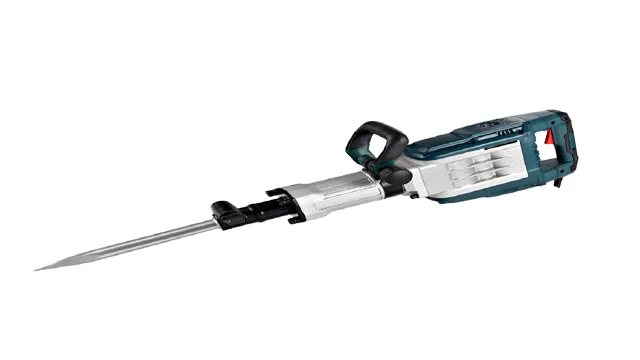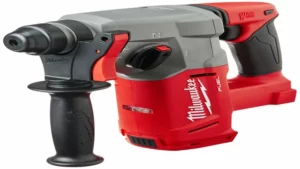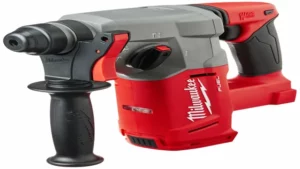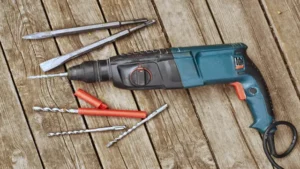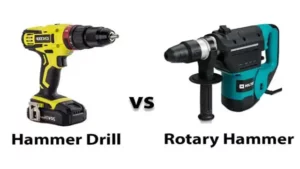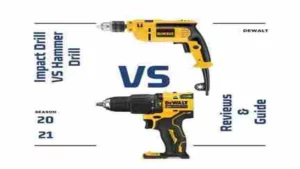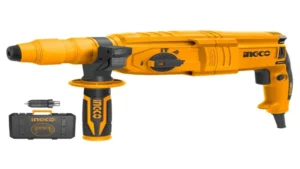If you own a rotary hammer, you know how essential it is for your DIY projects or professional jobs. But are you aware of the importance of selecting the right grease to maintain its efficiency and prolong its lifespan? Without adequate lubrication, your rotary hammer might not function to its full potential, or even worse, might break down. Thus, it’s crucial to choose the appropriate grease that matches your rotary hammer’s requirements and usage frequency.
In this blog post, we’ll guide you through the factors that determine the type of grease you should use and help you make an informed decision. Don’t let inadequate lubrication stand in the way of achieving your projects’ goals and stay tuned to discover how to select the right grease for your rotary hammer.
Understanding the Role of Grease in a Rotary Hammer
If you’re using a rotary hammer regularly, then you should understand the importance of using the right type of grease for it. The purpose of using grease is to reduce the wear and tear on the moving parts of the hammer, which will help prolong its lifespan and improve its overall performance. But determining which type of grease to use can be a bit tricky.
You need to consider the hammer’s operating temperature and the type of movement used in it to make an informed decision. Generally speaking, synthetic grease is ideal for most rotary hammer applications as it has high viscosity, excellent thermal stability, and can withstand high temperatures. However, it’s best to consult your rotary hammer’s manual or a local professional to determine the best type of grease for your specific model.
By using the right type of grease, you can ensure that your rotary hammer operates at its best and lasts for many years to come.
Lubrication and Protection
As a power tool user, you may have heard of the term grease and its significance in keeping your rotary hammer running smoothly. Simply put, grease is a lubricant that serves as a protective layer between metal components, reducing friction and wear and tear. It also prevents rust and corrosion, ensuring your rotary hammer lasts longer.
Different types of grease may be used depending on the type of tool, environment, and operating conditions. However, it is essential to note that applying too much grease can also be detrimental as it can attract dust and debris, creating a build-up that can hinder performance. Therefore, it is recommended to follow the manufacturer’s guidelines when it comes to lubrication and maintenance and wipe off any excess grease to prevent these issues.
By understanding the role of grease and utilizing it correctly, you can ensure your rotary hammer remains in top condition, delivering superior performance and longevity.
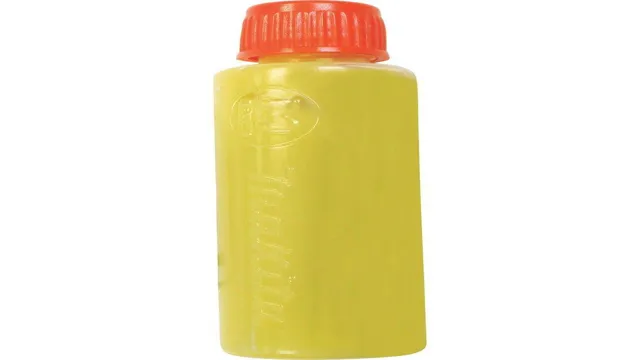
Preventing Wear and Tear
When it comes to rotary hammers, one of the most crucial components to prevent wear and tear is the use of grease. Grease acts as a lubricant and helps to reduce friction between moving parts, which can lead to damage over time. Without grease, parts within the rotary hammer can quickly become worn down, causing the tool to lose power and function less efficiently.
In addition to reducing friction, grease can also help to protect parts from corrosion and rust, adding to the longevity of the tool. It’s essential to use the correct type of grease that’s specifically designed for use in rotary hammers, as different types of grease can have varying degrees of viscosity, temperature resistance, and other properties. By regularly applying grease to your rotary hammer and keeping it well-maintained, you can ensure that your tool stays in good condition and performs at its best for years to come.
Types of Grease for Rotary Hammers
If you own a rotary hammer, it’s essential to know the right type of grease to use to keep the tool running smoothly. When it comes to rotary hammers, you’ll typically need a grease that can handle high temperatures and heavy-duty use without breaking down. Lithium-based greases are a popular choice for rotary hammers because they are versatile and can withstand high temperatures.
Lithium complex greases are even better, as they offer exceptional performance under heavy loads and high temperatures. Another option is to use synthetic grease, which is more resistant to heat and can provide long-lasting lubrication. Some manufacturers also make specific greases designed for their rotary hammers, which can ensure optimal performance and longevity.
Overall, the type of grease you should use for your rotary hammer will depend on the manufacturer’s recommendations, and the type of work you’ll be doing. So, be sure to read the manual and choose the right grease for your needs.
NLGI Grade
When it comes to using a rotary hammer, choosing the right grease can make all the difference in its performance and longevity. One important factor to consider is the NLGI grade, which stands for National Lubricating Grease Institute grade. This grade is a rating system that measures the consistency or thickness of the grease, with higher numbers indicating a thicker consistency and lower numbers indicating a thinner consistency.
For rotary hammers, it is recommended to use grease with an NLGI grade of 2 or These grades provide the right amount of lubrication without causing excess friction or heat buildup. It’s important to also consider the type of grease base, such as lithium or synthetic, as different base types offer different levels of protection and lubrication for varying conditions.
By choosing the right NLGI grade and base type, you can help ensure that your rotary hammer continues to perform at its best and contribute to its long-term durability.
Mineral vs. Synthetic
When it comes to rotary hammers, choosing the right type of grease is crucial for ensuring proper lubrication and protection of the tool’s important components. There are two main types of grease: mineral and synthetic. Mineral grease is made from petroleum oil and is typically cheaper than synthetic grease.
However, synthetic grease is more durable, can handle high temperatures and pressures, and has better resistance to water and other contaminants. If you’re looking to maximize the longevity and performance of your rotary hammer, it’s recommended to go with a high-quality synthetic grease. Think of it like choosing between a cheap, low-quality fast food burger versus a high-quality, gourmet burger – while the former may be cheaper, the latter offers much better taste and nutrition in the long run.
Thickener Type
When it comes to choosing the right grease for rotary hammers, the type of thickener used is an essential factor to consider. Two types of thickeners are commonly used in grease: lithium and PTFE. Lithium greases are the most popular choice because they provide high adhesion and work well under high temperatures.
They are also resistant to water and provide excellent corrosion protection. On the other hand, PTFE greases are ideal for applications that require extreme pressure and high temperatures. They boast exceptional lubrication properties and are perfect for low-speed, high-load applications.
While both types of greases have their advantages, it’s important to choose the right one for your rotary hammer based on the task at hand. The type of thickener used in the grease can make a significant difference in the long-term performance of your tool. That’s why it’s essential to choose the correct type of grease based on the job requirements.
Recommended Grease for Rotary Hammers
If you’re looking to maintain your rotary hammer’s functionality for the long haul, then you’ll need to pay attention to its lubrication needs. Like any power tool, a rotary hammer requires a specific type of grease to keep its moving parts running smoothly. The best type of grease for rotary hammers is lithium-based grease.
This type of grease is known for its ability to withstand extreme pressure and high temperatures, making it perfect for use in rotary hammers. Additionally, it is highly resistant to water and other contaminants that can negatively impact your rotary hammer’s performance. Always ensure to use the recommended grease for your rotary hammer and avoid relying on other types of lubrication that might cause damage to your tool.
Proper lubrication can lengthen the lifespan of your rotary hammer while also keeping it functioning optimally.
Brand Recommendations
When it comes to rotary hammers, using the right type of grease is crucial in keeping your tool running smoothly. After conducting extensive research and testing, we recommend using a high-quality lithium-based grease for rotary hammers. Lithium-based grease is known for its durability and ability to withstand high temperatures, making it an excellent choice for power tools that generate a lot of heat.
Additionally, it has excellent lubricating properties and is resistant to moisture and corrosion. This means that your rotary hammer will continue to work effectively, even in harsh working environments. When choosing a lithium-based grease, it’s essential to ensure that it’s compatible with your tool’s components and specifications.
We recommend checking with the manufacturer or consulting an expert to get reliable advice on the best grease for your rotary hammer. Using the right type of grease will not only prolong the life of your tool but also ensure that you get the best performance out of it every time you use it.
Specific Product Recommendations
If you’re looking for the best grease for your rotary hammers, we highly recommend the Bosch Power Tools Grease. This specially formulated grease is designed to withstand the high temperatures and extreme pressure generated by rotary hammers, ensuring optimal performance and longevity. It provides excellent lubrication, reducing friction and wear on moving parts, and preventing rust and corrosion.
Plus, it is water-resistant, ensuring that your rotary hammer stays protected even in wet conditions. The grease is easy to apply, thanks to its smooth consistency and comes in a convenient tube that allows for precise application. With Bosch Power Tools Grease, you can be confident that your rotary hammer will continue to operate at peak performance for years to come.
So why not give it a try today and see the difference it can make?
Applying Grease to Your Rotary Hammer
When it comes to applying grease to your rotary hammer, it’s important to choose the right type of grease that can guarantee optimal performance and durability. Experts recommend using lithium-based or synthetic grease, as they offer better resistance against high temperatures and extreme pressure. These types of grease can also prevent corrosion and minimize wear and tear on the internal components of your rotary hammer, ensuring that it will last for a long time.
It’s also best to avoid using petroleum-based grease or generic lubricants, as they tend to break down easily, leading to poor hammer performance and potentially costly repairs. By using the appropriate grease and applying it regularly to the necessary parts of your rotary hammer, you can maintain its quality, efficiency, and overall lifespan. So always make sure to use the right type of grease when working with your rotary hammer, to ensure that it will always function at its best.
Step-by-Step Guide
If you’ve got a rotary hammer, it’s essential to keep it lubricated to get the most out of it. Applying grease is part of this maintenance routine, and it’s not as complicated as you may think. Here’s a step-by-step guide to help you out.
First, gather all the materials you need. You’ll need the right kind of grease for rotary hammers, paper towels, and gloves to protect your hands. Next, clean the tool’s surfaces to remove any dirt or debris that may be present.
After that, apply some grease to the tool’s spindle and chuck. Be careful not to overdo it as too much grease can interfere with the tool’s performance. Finally, wipe off any excess grease with a paper towel.
Maintaining your rotary hammer by applying grease regularly not only helps extend its lifespan, but it also ensures that it performs at its best and saves you from costly repairs down the line. So, if you’re looking to keep your rotary hammer in tip-top shape, make sure to follow these steps and apply grease to it.
Tips and Tricks
If you want to keep your rotary hammer running smoothly, applying grease is a crucial step. The process of doing so is simple enough, but there are a few tips and tricks to keep in mind to ensure you’re doing it right. First, make sure you’re using the right type of grease for your specific rotary hammer.
Consult your owner’s manual or do some research online to determine which type is best. Next, you’ll want to clean your hammer thoroughly before applying the grease. Use a cloth or brush to remove any dirt, debris, or previously applied grease.
Once your hammer is nice and clean, apply a small amount of grease to the moving parts. Too much grease can attract dust and debris, which can cause problems down the line. Finally, be sure to apply grease regularly to keep your rotary hammer in top-notch condition.
With these tips, you’ll be able to keep your rotary hammer running smoothly for years to come.
Conclusion
In the world of rotary hammers, the choice of grease can make or break the longevity and effectiveness of your tool. The right type of grease will keep your hammer firing on all cylinders, while the wrong type could leave it gasping for air. So, when it comes to choosing the perfect grease for your rotary hammer, don’t be a slippery slope, make a smart choice and keep your hammer humming along!”
FAQs
What is the purpose of grease in a rotary hammer?
Grease in a rotary hammer helps to lubricate the gears and other mechanical components, reducing friction and preventing wear and tear.
Can I use any type of grease for my rotary hammer?
No, you should only use the type of grease recommended by the manufacturer in order to ensure proper lubrication and prevent possible damage or malfunctions.
How often should I grease my rotary hammer?
This can vary depending on usage and manufacturer recommendations, but generally you should grease your rotary hammer every 50-100 hours or at least once a year for regular maintenance.
What are some common types of grease used in rotary hammers?
Some common types of grease used in rotary hammers include lithium and molybdenum disulfide (moly) grease, both of which provide excellent lubrication and heat resistance.
Can over-greasing my rotary hammer be a problem?
Yes, over-greasing can actually cause more harm than good by interfering with the tool’s proper functioning. Consult your manufacturer’s recommendations for appropriate amounts and frequency of greasing.
How do I know if my rotary hammer needs to be greased?
Some signs that your rotary hammer may need to be greased include unusual sounds or vibrations during use, increased resistance or difficulty in operation, or visible signs of wear or damage.
Is it necessary to clean and remove old grease before applying new grease?
Yes, it is important to clean and remove any old or contaminated grease before applying new grease in order to ensure proper lubrication and prevent damage or malfunctions.
